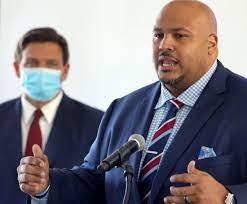Senate committee backs school vouchers for all students
Orlando Sentinel | By Ryan Dailey | February 21, 2023
TALLAHASSEE — The Senate began moving forward Tuesday with a proposal that would make every Florida student eligible for state-backed vouchers for private-school tuition and home-schooling after opponents argued the measure would harm public schools.
The Senate Education PreK-12 Committee voted 9-3 along party lines to approve the measure (SB 202). The bill would end current eligibility requirements for vouchers such as limits on household income.
Under the bill, families could qualify to receive vouchers if “the student is a resident of this state and is eligible to enroll in kindergarten through grade 12 in a public school in this state.”
Democrats questioned the elimination of income-eligibility rules.
Sen. Lori Berman, D-Boca Raton, asked whether a family earning $500,000 a year would be eligible for vouchers.
“Well, the short answer is yes. Because we’re not funding parents, we’re funding students. That’s what this bill is,” said committee Chairman Corey Simon, a Tallahassee Republican who is sponsoring the measure.
In addition to expanding voucher eligibility, the proposal would essentially create what are known as education savings accounts. The flexible-spending accounts could be used for purchases such as tutoring services, instructional materials and contracted services provided by public schools.
The measure also would allow families of home-schooled students to receive vouchers, with a limit of 10,000 home-schooled recipients next school year. That number would increase by 20,000 in each subsequent year.
Sen. Erin Grall, R-Vero Beach, supported the measure Tuesday but questioned whether families of home-schooled students should be allowed to receive the same voucher funding as students whose families would use the money for private-school tuition.
“I think that the potential for abuse rises significantly with the dollar amount and keeping a child at home,” Grall said.
Grall also suggested changes that she said would address concerns related to “being accountable to the taxpayer” and to parents.
Grall proposed that information about participating private schools could be posted online. Such information could include whether the schools are accredited, whether they serve students with particular disabilities and the curriculums used by the schools.
Responding to Grall’s comments, Simon said after the meeting that he is open to potential changes.
“I think her concerns are very valid, and we’ll sit down and continue to pick apart this bill on ways we can make it better,” Simon said.
Questions about the potential cost of the measure remained Tuesday. The financial impact of the proposed changes has not been determined, Simon told reporters.
The bill drew support from several parents of students who receive Family Empowerment Scholarship vouchers for students with disabilities. Those scholarships allow families to make a range of purchases similar to education savings accounts.
But some critics expressed concerns about a potential erosion of traditional public schools. Cathy Boehme, a lobbyist who represents the Florida Education Association teachers union, called for “fiscal responsibility.”
“When we fund private-school students who have never been to public school, it will come out of public-school dollars. So, let’s make sure we get the math right on the estimations so that we do no harm to any of our students,” Boehme told senators.
Bill Montford, a Democratic former state senator who is CEO of the Florida Association of District School Superintendents, spoke in support of the measure on behalf of the organization. Montford said superintendents “are not afraid of competition.”
A similar House measure (HB 1) will be considered Thursday by the PreK-12 Appropriations Subcommittee.






